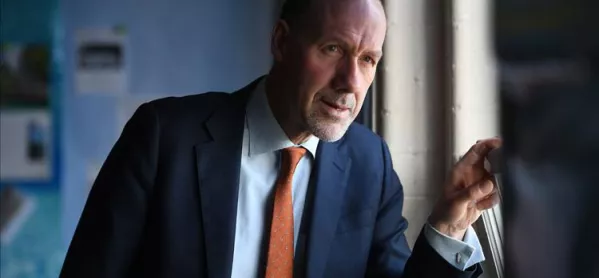- Home
- Society needs to decide the kind of education service it is prepared to pay for
Society needs to decide the kind of education service it is prepared to pay for

This week in Parliament the chair of the Education Select Committee asked a very good, very simple question: “So how much money do schools and colleges need?”
In response, he got a range of answers.
And that tells us something very important - namely that beneath the current debate about education, funding is a far bigger issue: what kind of education service do we wish to provide for our children and young people? What do we think they are entitled to?
Because unless we know that, how can we possibly know how much it will cost?
On the evening that Robert Halfon’s committee met, we saw on BBC2 a documentary about education that didn’t do what most documentaries about education do. It didn’t trivialise; it didn’t glamorise; it didn’t caricature the pupils or the staff. Instead - in the great tradition of fly-on-the-wall journalism - School allowed viewers to see what life in one school is like, warts and all.
And what we saw was something that those of us who inhabit education’s echo chamber have long known: that schools and colleges do far more than most people probably realise.
Here were hard-working, committed professionals doing all they could to teach young people, to nurture them, to calm them down when needed, to motivate them before exams, nudging them to think harder, to behave better, to aim higher.
And these staff were doing it against a backdrop of devastating financial cuts in buildings that looked worn and battered.
It was a documentary that showed just how the expectations on schools and colleges have exponentially developed over the past 20 years.
These days we don’t just teach children to read, write and learn a few academic subjects, but also provide extensive pastoral support, counselling, SEND support, safeguarding, PSHE, and increasingly fill the gaps left by the depletion of services beyond the school gates.
Back in 2003 - in an age when education was a publicly-espoused prime ministerial priority - we saw the way joined-up services were intended to support children from every background, including their physical and mental health needs. It was the era of “Every Child Matters”.
I remember as a head for 15 years how we would have a community police officer on a weekly visit to the school, how support workers could help to head off poor behaviour habits that in some youngsters were spiralling out of control, and how we were able to provide high-impact teaching assistants to work with youngsters who might otherwise have been left on the margins.
I remember the after-school clubs we could put on for children whose home lives might be too chaotic to get homework done in peace, and the extra resources for textbooks and support for trips and visits.
It meant that we could live the reality that every child mattered.
In recent years, we have seen the erosion of both the funding levels for schools and colleges and vital services in the community. The reality is that we are in danger of being reduced to a core provision of reading, writing and a small range of academic subjects.
The problem with this is not only the dispiriting lack of ambition which is implicit in such a constrained funding model. The really pernicious effect will be on the many young people who desperately need the additional support that schools provide in order to be able to fully access the curriculum and fulfil their potential. It is the most vulnerable learners who are most at risk from the funding cuts.
So, we need to start by defining what it is that we want our education service to provide. Because, as a country, we surely cannot allow ourselves to sleepwalk into a situation where every child doesn’t matter.
Ministers will, of course, insist that there’s enough money to keep the plates spinning if only we tighten our belts a bit more. But it is quite a gamble to ignore the voices of the thousands of headteachers, teachers and parents who are telling them otherwise.
What I do know is that the underfunding of the education system comes with a huge social cost. Diminished life chances mean more poverty, more physical and mental health problems, more strain on social services, and a weaker economy. Education should be seen as a vital strategic investment, not a cost to be trimmed.
Robert Halfon’s question was a good one: how much money do we need?
But we won’t get anywhere near an answer until as a society we are clearer about what we expect for every child.
Our arcane and often arbitrary funding system isn’t built from the ground up on what we need but from the top down on how much we want to spend. It’s upside down, and any government which seeks to work with the education sector to put it the right way up would be doing an invaluable service for children long into the future.
Geoff Barton is general secretary of the Association of School and College Leaders
Keep reading for just £1 per month
You've reached your limit of free articles this month. Subscribe for £1 per month for three months and get:
- Unlimited access to all Tes magazine content
- Exclusive subscriber-only stories
- Award-winning email newsletters



